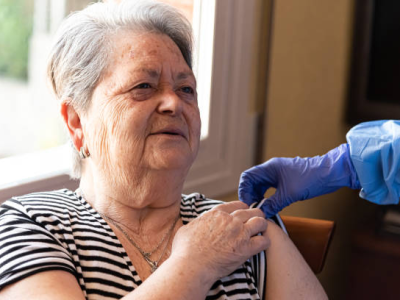Jan 4, 2012 (CIDRAP News) – The US Food and Drug Administration (FDA) today ordered that certain uses of cephalosporin antibiotics be prohibited in animals, a move aimed at preventing antibiotic resistance and preserving the drug's effectiveness for treating human diseases.
The new FDA order, which takes effect Apr 5, applies to off-label or unapproved use of cephalosporins in major food-producing animals: cattle, swine, chickens, and turkeys. The FDA said in a statement that it considered substantial public comments on a similar order that it issued in 2008 but revoked before implementation.
In a separate document, the FDA said it revoked the earlier order after many stakeholders said it was too broad and failed to meet the legal standard for a prohibition order. The FDA said it believes that order did meet the legal standard, but its scope could have been more targeted.
Today's announcement comes on the heels of two recent FDA actions that were interpreted by some as suggesting that the agency was backtracking on its efforts to limit antibiotic use in food animals. In those cases, the FDA indicated it was relying mainly on a voluntary approach described in draft guidance issued in 2010.
In humans, cephalosporins are commonly used to treat pneumonia and skin and soft-tissue infections, the FDA said. The antibiotic class is also used to treat pelvic inflammatory disease, diabetic foot infections, and urinary tract infections. Newer ones, such as ceftriaxone, are used to treat hospital patients who have life-threatening diseases, according to the FDA.
Newer cephalosporins are the treatment of choice for serious Salmonella and Shigella infections, especially in children, who are vulnerable to the potentially toxic effects of fluoroquinolones.
The FDA said the prohibited cephalosporin uses will include:
- Unapproved dose levels, frequencies, durations, or administration routes, such as injections into chicken eggs or the use of biobullets in beef cattle
- Use of drugs not approved for livestock or poultry, such as cephalosporins intended for humans or companion animals
- Disease prevention
The FDA said the 2008 order that it issued and then revoked didn't contain any exceptions. However, today's order contains three exceptions that came from public comments on the topic.
One exception is that the order doesn't limit the use of cephapirin, an older cephalosporin that the FDA doesn't believe contributes significantly to antibiotic resistance. In a background document that accompanied today's statement, the FDA said no cephapirin drug products are approved for humans, and their spectrum of activity is narrow compared with that of newer cephalosporins.
Also, veterinarians can still prescribe cephalosporins for "limited extra-label use" in cattle, swine, chickens, or turkeys if they follow label instructions for dose, frequency, duration, and route of administration. Third, they can also prescribe off-label uses for minor food-producing species such as ducks or rabbits.
Dr Michael Taylor, the FDA's commissioner of foods, said in the statement, "We believe this is an imperative step in preserving the effectiveness of this class of important antimicrobials that takes into account the need to protect the health of both humans and animals."
As with the earlier order, the FDA is asking stakeholders to comment. The comment period opens Jan 6 and closes Mar 6, according to a Federal Register notice. The FDA said it would consider the feedback before the order takes effect on Apr 5.
Rep Louise Slaughter, D-N.Y., a microbiologist who has authored legislation aimed at preserving antibiotics' effectiveness for treating human disease, today voiced lukewarm support for the FDA's order.
In a statement e-mailed to journalists, she said the rule addresses "just the tip of the iceberg." Slaughter said the action comes 3 years after the FDA determined that extra-label use in food animal production posed a public health threat.
"This is a modest first step by FDA," she said. "We don't have time for the FDA to ploddingly take half-measures. We are staring at a massive public health threat in the rise of antibiotic-resistant superbugs. We need to start acting with the swiftness and decisiveness this problem deserves."
The Center for Science in the Public Interest (CSPI), a consumer group, has also been pressing federal officials to take more action to limit antibiotic use in food animals. In a statement today, Caroline Smith DeWaal, the CSPI's food safety director, called the order a small step toward preventing foodborne illness outbreaks from antibiotic-resistant pathogens, but said it may be too little, too late.
DeWaal said the CSPI has identified at least five foodborne illness outbreaks since 2001 that were linked to cephalosporin-resistant Salmonella and that involved at least 200 infections and 1 death. "Extralabel use of cephalosporin is only part of the problem. FDA should act soon to restrict or eliminate all unnecessary uses of antibiotics critically important to human medicine, so they can be preserved for future generations," she said in the statement.
Jeff Bender, DVM, MS, director of the Center for Animal Health and Food Safety at the University of Minnesota in St. Paul, predicted that the new restriction will have an impact on agriculture and will probably spur efforts by industry to broaden the label indications for cephalosporins.
"These drugs are widely used and they're effective in the respective industries, livestock and poultry," he told CIDRAP News. "This is going to have an effect on the way producers and veterinarians deal with disease in these animals. . . . It does create some challenges."
Bender said the main example of an off-label use of cephalosporins is their inclusion in vaccines injected into chicken and turkey eggs; the drugs are added to prevent infections from bacteria sometimes found in the vaccines (which are typically aimed at viral diseases).
"That's one of the areas the FDA has probably been concerned about as a preventive measure," he said. Some cephalosporin uses in swine and cattle will probably be affected too, he added.
He commented that the FDA move "does seem to be justified" in view of recent increases in resistance to cephalosporins. But whether the restriction will lead to a decrease in resistance remains to be seen, as data on results of such restrictions are "pretty limited," he said.
"The bacteria sometimes acquire the resistance elements and don't let them go," he said.
One cephalosporin that's widely used in livestock is ceftiofur, whose main label indication is for pneumonia, Bender commented. He said its label indications were recently expanded, and added, "I think that's what's going to happen [in the wake of the FDA restriction]—more activity from industry to broaden the label indications."
In November 2011 the FDA denied two petitions from consumer and other groups, including the CSPI, to limit the use of several antibiotics in farm animals, saying a voluntary approach that it proposed in 2010 would lead to more judicious use in agricultural settings.
A month later, the FDA withdrew two hearing notices dating back to 1977 on certain uses of penicillin and tetracyclines in livestock, saying for now it is relying on a voluntary strategy outlined in June 2010 draft guidance. In the notice, the FDA said it was still concerned about antimicrobial resistance and that the actions didn't signal that the FDA no longer had safety concerns.
Consumer groups have expressed disappointment with the petition denials and hearing notice withdrawals and have said the proposed voluntary approach won't work.
See also:
Jan 4 FDA press release
Jan 4 FDA background information
Jan 4 CSPI statement
Nov 10, 2011, CIDRAP News story "FDA denies pleas to restrict antibiotic use in livestock"
Dec 23, 2011, CIDRAP News Scan "FDA reaffirms voluntary strategy for limiting ag antibiotic use"




















